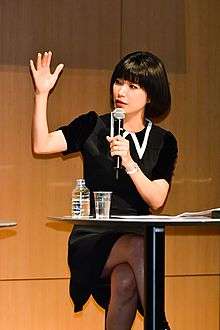Mieko Kawakami
| Mieko Kawakami 川上 未映子  Mieko Kawakami in 2014, giving a lecture in Tokyo. | |
|---|---|
| Born |
August 29, 1976 Osaka, Japan |
| Occupation | Author, poet |
| Nationality | Japanese |
| Genre | Fiction, poetry, essay |
| Notable works | Breasts and Eggs (2008), Heaven (2009), Dreams of Love, Etc. (2013) |
Mieko Kawakami (川上未映子, August 29, 1976) is a contemporary Japanese writer and poet. She was born in Osaka prefecture, the second largest Japanese capital and the center of commerce and culture. Kawakami started her career as a singer songwriter before making her literary debut with the prose poem, "Sentan de sasuwa sasareruwa soraeewa" in 2006.
Her first novella My Ego Ratio, My Teeth, and the World, published in 2007, won critical acclaim for its earnest exploration of the subject "I" through a lyrical narrative interwoven with rhythmic and poetic style. The novella was awarded the Tsubouchi Shoyo Prize for Young Emerging Writers (Haruki Murakami won the same prize for the established writers category in the same year).
In the following year, Kawakami published her second novella Breasts and Eggs, which dynamically explores the inner conflicts of an adolescent girl, who refuses to communicate with her mother except through writing. This work won the Akutagawa Prize (the most prestigious literary prize in Japan, previously awarded to writers such as Kobo Abe and Kenzaburo Oe) with enthusiastic support from committee members, and has been translated into Norwegian, Spanish, French, and other Asian languages.
In 2009, Kawakami published her first full-length novel, Heaven. Gaining inspiration from Nietzsche's Thus Spoke Zarathustra, the work takes up the theme of bullying in middle school and addresses the ultimate question of good and evil. The novel won critical acclaim soon after its publication and won the Ministry of Education's Fine Arts Award for Debut Work, as well as the Murasaki Shikibu Prize (an award given to female writers). This novel established Kawakami's position in contemporary Japanese literature only three years after her debut.
In her subsequent works, Kawakami continues to address existential questions such as life, death, and sexuality, giving voice to the feeling of disorientation that people innately harbor but which often goes unexpressed. These works include the collection of short stories Dreams of Love, Etc., which won the Tanizaki Jun'ichirô Prize, and her second novel All the Lovers in the Night, a love story centering upon a female protagonist whose profession as a proofreader is central to her worldview. Her third novel Longingcaptures the dizzying sensations of experiencing the world through the eyes of children, shifting between the perspectives of a boy and a girl.
Alongside these works of prose fiction, Kawakami has published experimental works that combine astute thought and feminine sensibility in a heightened poetic style. Her versatility in style and genre is partly what makes her a unique writer. Her collection of prose poems Sentan de sasuwa sasareruwa soraeewa, which includes the piece that pushed her onto the literary stage, sold exceptionally well and was awarded the Nakahara Chuya Prize (one of the most prestigious prizes for Japanese poetry). Her poetic works explore experimental language and rhythm, and have received high praise for their lyricism and linguistic and philosophical diversity. Her subsequent poetic work Water Vessel (awarded the Takami Jun Prize) also received critical acclaim, and many praise her experimental works even above her novelistic achievements.References
Recognition
Prizes for books
- 2007: Tsubouchi Shoyo Prize for Young Emerging Writers for My Ego Ratio, My Teeth, and the World
- 2008: Akutagawa Prize for Breasts and Eggs
- 2009: Nakahara Chuya Prize for Sentan de sasuwa sasareruwa soraeewa
- 2010: Ministry of Education's Fine Arts Award for Debut Work for Heaven
- 2010: Murasaki Shikibu Prize for Heaven
- 2013: Takami Jun Prize for Water Vessel
- 2013: Tanizaki Prize for Dreams of Love, Etc.
- 2016: Watanabe Junichi Prize for Longing.
External links
- http://www.mieko.jp/mieko-kawakami Mieko Kawakami's Official Website (English)